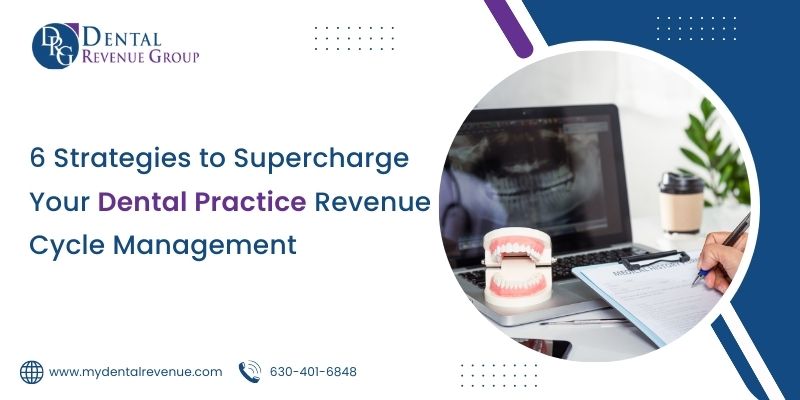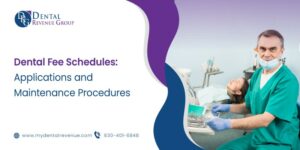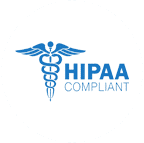Dental revenue cycle management goes beyond simply handling dental billing and coding. As your practice grows, setting up an efficient RCM process is more important than ever. It delves deeper into optimizing workflow processes to achieve revenue goals. It also focuses on identifying and promptly addressing points where revenue leakage occurs. A well-functioning revenue cycle management system is essential for attaining targeted results. Do you know what you need to know to manage your dental practice’s revenue cycle? This blog aims to provide guidance on enhancing your dental billing revenue cycle management.
Dental Revenue Cycle Management
Dental revenue cycle management involves handling various services with different staff members at different levels. Each claim goes through multiple stages, and maintaining claim quality becomes challenging at each stage. Efficient dental revenue cycle management services directly impact the quality of claims and increase revenue flow. Improving your financial system through revenue cycle management is crucial for the financial growth of a dental billing company. Understanding the complexities of revenue generation and collection is vital for efficient revenue cycle management in dental practices.
Key Factors That Impact Dental Practice RCM
Dental practices constantly prioritize cash flow, essential for a thriving practice. Timely payments from insurance carriers and patients and accurate claims submissions are crucial. During periods of economic uncertainty, optimizing revenue cycle management (RCM) practices becomes even more important, enabling efficient payment collection and minimizing claim denials. RCM initiates with patient registration and, when executed effectively, culminates in the complete collection of accounts receivable balances. Here are a few factors that impact dental revenue cycle management (RCM) negatively.
Neglecting Insurance Verification
- Failing to check a patient’s insurance coverage before procedures can lead to complications in payment processing.
- Verifying insurance beforehand ensures that treatments are covered and helps avoid claim denials.
Delayed Collection of Copays
- Not collecting copayments on the day of the appointment can result in revenue loss.
- Collecting copays upfront ensures immediate payment and reduces the risk of outstanding balances.
Overlooking Outstanding Balances
- Neglecting to collect outstanding balances after insurance payments can negatively impact cash flow.
- Timely collection of balances ensures proper revenue capture and avoids unnecessary losses.
Coding Errors
- Incorrect coding and failing to stay updated with coding changes can lead to claim rejections.
- Being vigilant with accurate coding practices and staying informed about coding updates helps prevent revenue loss.
Inadequate Insurance Denial Follow-up
- Not promptly addressing insurance denials can result in prolonged payment delays.
- Timely follow-up on denials ensures timely resolution, reduces claim rejections, and maximizes revenue recovery.
Tips To Enhance Your Dental Practice RCM
If you find any of the aforementioned issues relatable, rest assured that you are not alone. Balancing exceptional patient care with evolving regulations and insurance demands can be daunting for many dentists. However, if you aspire to enhance your dental practice RCM, adopting the following best practices can lead to improved practice revenue, increased cash flow, and optimal management of accounts receivable.
Build Strong Workforce Collaboration
Efficient dental revenue cycle management (RCM) requires a collaborative workforce well-versed in handling every aspect of the process. Each stage of the claim processing journey relies on the seamless connection between different scopes of services. Any disruptions or errors in claim processing can jeopardize the efforts invested in other areas. It is crucial for the staff involved to recognize the significance of their interconnected roles and work together to minimize claim denials at every level. By fostering strong workforce collaboration, the chances of denials can be reduced, ensuring smooth revenue flow throughout the RCM process.
Conduct Regular Audits
Regular audits play a crucial role in controlling and minimizing claims denials. Repeated errors can be identified and addressed by implementing checkpoints at each level of the revenue cycle management (RCM) process. The reasons behind claim denials can be analyzed through internal audits, enabling the notification and education of relevant teams or staff members to prevent a recurrence. Reducing denials serves as an important initial step toward enhancing revenue and optimizing the RCM process.
Implement Monthly Reporting for Paid vs. Claim Percentage Projection
Establishing an efficient reporting system is essential for monitoring growth trends, identifying loopholes, and evaluating the percentage of work, paid, and denied claims. Revenue cycle management (RCM) encompasses dental billing and claims submission but also the overall financial status of the business. You can obtain real-time insights into your payment receipts and outstanding balances by closely examining monthly reports. This enables you to direct your efforts toward recovering missed revenue and aligning your strategies accordingly.
Having an Experienced Billing Partner
A billing partner with extensive experience and expertise in dental revenue cycle management (RCM) is crucial for achieving desired outcomes in your billing company. However, finding and retaining skilled staff members can often be challenging. Outsourcing your dental revenue cycle management to a reputable dental billing outsourcing company can alleviate the stress associated with these tasks. Recent research has shown that offshore outsourcing is an excellent option for US-based dental billing companies, especially during critical situations. It allows your company to stay afloat and effectively navigate challenges while benefiting from the expertise and resources of an experienced billing partner.
Conduct Coding Audits
Regular coding audits are essential for improving dental revenue cycle management (RCM) and ensuring accurate coding practices. Coding in dental billing can be challenging and prone to errors, making it crucial to identify and rectify recurring mistakes and instances of non-compliance with coding guidelines and client-specific protocols. Conducting coding audits helps identify these errors and areas of improvement, leading to enhanced accuracy and overall efficiency in the coding process. By regularly reviewing and assessing coding practices, dental billers can ensure proper coding guidelines and protocols are followed, resulting in improved dental revenue cycle management and healthier billing processes.
Strategic Scheduling
Strategic scheduling is key to keeping your dental practice’s revenue flowing. It is vital to maintain a full schedule, as without patients, there is no business. To ensure a busy calendar, your team should take proactive steps, such as following up with patients regarding unscheduled treatment.
For instance, if a patient visits for a routine cleaning, and you notice that they need some fillings but haven’t scheduled an appointment yet, you can reach out to them and explain the importance of getting the fillings done for their oral health. Offer them multiple appointment options to fit their schedule. By taking steps like these, you can fill your calendar with purpose and ensure that your patients receive the care they need while keeping your revenue cycle moving forward.
How Does the Dental Revenue Group Help
We leverage our expertise in claim handling, performance consulting, and data collection to provide seamless dental revenue cycle management (RCM) solutions. We offer RCM and dental billing services tailored specifically for dental practices. Our client base encompasses dental entities, including dental practices, dental service organizations, and nationwide enterprise networks. We specialize in dental billing that effectively optimizes revenue and minimizes denials. Our expertise lies in comprehending the intricacies of dental office business operations.
Discover more about our tailored solutions and how we can assist your dental practice in optimizing revenue cycle management.











